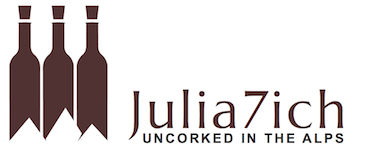Wörgl?!
Why do I live here?
I’m still learning how to pronounce “Wörgl” properly. It works best after a glass of wine.
Do you know how you pronounce “Ö”?
Shape your lips in an “O” and say “ER”!
Did you try it? Easier than you thought, isn’t it?
Now instead of “W”, put “V” on the beginning. Try to roll your “R” as best you can.
That’s it!… WÖRGL!
Whew! We deserve a break and a big, appetizing glass of peppery Grüner Veltliner!
Gerhard Mayr and I have been organizing training tastings for ourselves and fellow MW students here in Wörgl, Austria for the past two years. MW students from all over Austria as well as those residing in the bordering countries Switzerland, Italy, Hungary and Germany come to Wörgl for exam training and preparation.
No one in the wine world has ever heard of Wörgl. It’s in the Austrian Alps. No vines grow here. It snows. It freezes. Despite this, Wörgl is centrally located for central European Master of Wine students. It is has two autobahn exits and a train hub through which people must transfer coming from or to eastern Europe, Germany, Italy, or Switzerland. The nearest airports to Wörgl are in Innsbruck, Salzburg and Munich, and may all be reached in between ½ and 1 ½ hours.
Despite its convenient location, Wörgl would never have become such a base for MW students without the support of Bernhard Kammerlander and Hotel Schachtnerhof. Bernhard and his team supply MW students with an entire “MW setup” (12 Riedel tasting glasses, one spittoon, and water carafe and water glass per person) as well as a seminar room. Schachtnerhof also supplies storage for our tasting packages. Each of the participants (theoretically anyway – you know how that goes) puts together a tasting package of 12 wines emulating a past exam paper. Included in the package are the question paper, answer sheet, and afterwards the crib sheet for each participant. We store the tasting packages at in the hands of Bernhard Kammerlander at Schachtnerhof in Wörgl. Our host selects the package for each tasting training so that none of the MW students ever knows which package will be tasted. Bernhard tempers all of the wines at perfect temperature and decants them into neutral, numbered bottles. He does this free of charge, all in the name of furthering wine education!
 This weekend was our first tasting training for the 2009/2010 study year. It was also the last tasting training before I head off to Adelaide for the residential seminar. I’ve been tweaking my technique and I think I’m progressing, but I’m still far from the necessary level for passing the exam. (I’ll tell you more about the humiliating horrors of MW tasting in another blog post.)
This weekend was our first tasting training for the 2009/2010 study year. It was also the last tasting training before I head off to Adelaide for the residential seminar. I’ve been tweaking my technique and I think I’m progressing, but I’m still far from the necessary level for passing the exam. (I’ll tell you more about the humiliating horrors of MW tasting in another blog post.) Meanwhile, here is a pic of tonight’s gorgeous wine. 1978 Château Lascombes. Gerhard bought it at an auction in Munich a couple weeks ago for around 50 Euros. The label has been affected by humidity. The cork was saturated, but extremely firm and intact. The brand corresponded with the label and the label and molded bottle corresponded with documentation from the winery. The wine was stunning, vibrant, classic. Certainly a worthy farewell. Australia is beating the drum for regional authenticity. Will any Australian wine be able to portray a sense of place as authentically as this? I am curious about Australian vines and traditions. They are older than one might first believe…we shall see.
Meanwhile, here is a pic of tonight’s gorgeous wine. 1978 Château Lascombes. Gerhard bought it at an auction in Munich a couple weeks ago for around 50 Euros. The label has been affected by humidity. The cork was saturated, but extremely firm and intact. The brand corresponded with the label and the label and molded bottle corresponded with documentation from the winery. The wine was stunning, vibrant, classic. Certainly a worthy farewell. Australia is beating the drum for regional authenticity. Will any Australian wine be able to portray a sense of place as authentically as this? I am curious about Australian vines and traditions. They are older than one might first believe…we shall see.





